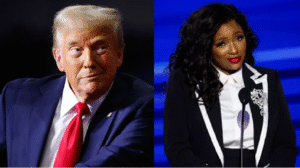Jasmine Crockett Sparks Uproar with Controversial Rally Remarks Linking Immigration to Slavery
Texas Congresswoman Jasmine Crockett, a rising star in the Democratic Party, is under intense scrutiny after making polarizing remarks at a recent rally—comments that have ignited a political firestorm and stirred widespread backlash across party lines.
The Moment That Lit the Fuse
Speaking on labor challenges in the agricultural sector, Crockett addressed the country’s continued dependence on immigrant workers. In a clip that quickly went viral, she said, “Ain’t none of y’all trying to go and farm right now,” followed by, “We done picking cotton.”
Though likely intended to underscore modern shifts in labor preferences and economic realities, her reference to “picking cotton” struck a nerve. The phrase conjured painful imagery of slavery, and critics swiftly condemned it as tone-deaf and historically insensitive.
Reactions have been fierce and varied. While some supporters defend her remarks as a blunt but honest reflection of uncomfortable truths, others—on both sides of the aisle—have accused Crockett of trivializing the brutal legacy of slavery in the U.S., reigniting debates over how elected officials frame complex issues of race, labor, and immigration.

Political Firestorm Erupts as Crockett Faces Mounting Criticism
The backlash was immediate and intense. Social media platforms lit up with reactions from across the political spectrum, as public figures, media commentators, and concerned citizens weighed in. Leading the charge was Fox News host Jesse Watters, who slammed Crockett’s comments as “divisive” and “out of touch” with the economic realities facing working-class Americans. He warned that such rhetoric risks alienating key voter blocs and widening social fractures in already struggling communities.
What added fuel to the blaze? Crockett’s silence. As of now, the congresswoman has not issued a formal apology or clarification, a move that many see as either a calculated stand or a misstep under pressure. Some suggest she believes her words were misunderstood, while others argue her refusal to address the controversy only intensifies public frustration. In the age of instant accountability, silence from a high-profile public figure can speak louder than words.

A Party at a Crossroads: What Crockett’s Comments Reveal About Democratic Messaging
Beyond the immediate backlash, Jasmine Crockett’s remarks have reignited a broader debate within the Democratic Party—one that centers on the challenge of aligning bold social justice advocacy with messages that resonate across a diverse and increasingly divided electorate.
For many observers, Crockett’s comments are more than a political misstep—they symbolize a growing struggle within the party to bridge the gap between progressive ideals and the everyday concerns of working- and middle-class Americans. As Democrats push forward on critical issues like racial justice, immigration, and economic reform, some fear that rhetoric rooted too deeply in identity politics risks alienating voters who feel left behind or unheard.
A Turning Point—or Warning Sign?
The lasting impact of this controversy on Crockett’s career is still uncertain. Some insiders see it as a potential inflection point—an opportunity for the party to reexamine how it communicates on sensitive topics. Others caution that if such messaging continues unchecked, it could further erode trust among key constituencies already skeptical of political elites.
At its core, the incident reveals a central tension in today’s political landscape: how to confront uncomfortable truths about America’s past and present without losing the ability to build broad-based coalitions. In an era where every word is scrutinized, the stakes for getting that balance right have never been higher.